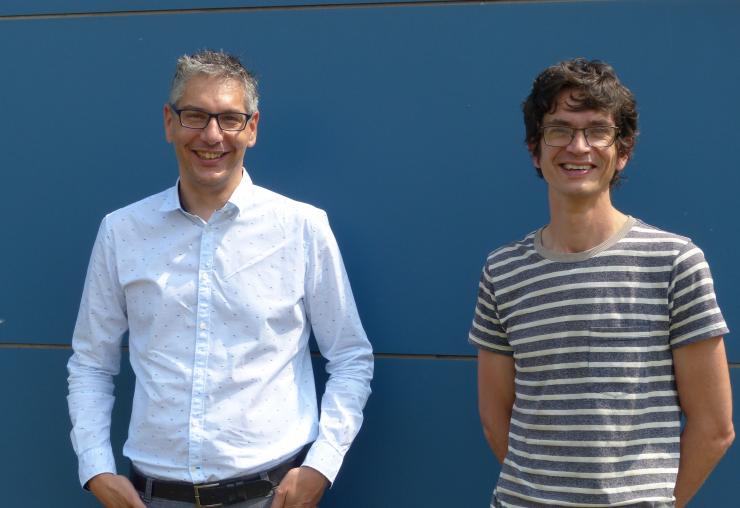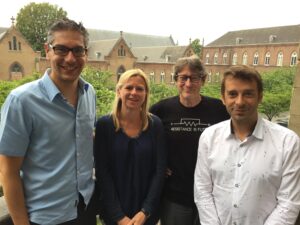Acute leukemia is an aggressive type of blood cancer characterized by an uncontrolled proliferation of white blood cells in the bone marrow, leading to an accumulation of (immature) blood cells throughout the body, impairing vital functions. It can occur at any age but is most prevalent in children, adolescents and the elderly. Today, most patients are treated with intensive chemotherapy, whether or not combined with a stem cell transplant. But even with such intensive treatment, acute leukemia remains a difficult to cure and life-threatening cancer. Moreover, the existing therapies have serious side effects. Therefore, there is a high clinical need for research to find new therapies.
At the cancer research institute Ghent (CRIG), several groups are involved in the fight against leukemia, including the team of Prof. Steven Goossens. We are very proud to announce that he received a prestigious ‘Strategic Basic Research (SBO)‘ -grant of two million euro to conduct research into a new therapeutic strategy for acute leukemia, together with his grant co-promotors Prof. Tessa Kerre, Prof. Savvas Savvides, Prof Serge Van Calenbergh, Dr. Dominic De Grootte and Prof. Patrick Chaltin (KU Leuven). SBO grants are awarded by the Research Foundation Flanders (FWO) and provide the necessary funding for innovative and groundbreaking research in Flanders with a concrete innovative application in mind (more info via the website of FWO).
In their project (scientific abstract below*), the team led by Prof. Steven Goossens will further investigate and try to target genes they recently identified to be essential for the survival of the leukemic cells. The researchers believe that temporarily suppressing or targeting these oncogenes could provide a new therapeutic treatment for these patients. As these oncogenes are transcription factors, performing their functions in the nucleus of the cell and therefore difficult to reach and target, classical drugging approaches are inadequate. Therefore, the team led by Steven Goossens will use and refine recently developed revolutionary technologies to be able to target these transcription factors anyway, and as such improve treatment options and the prognosis of acute leukemia patients.
Professor Steven Goossens (CRIG, UGent): “With this project, we want to translate our recent research results into clinical applications. The financial support will allow us to execute this project with the most innovative technologies and with a diverse team of fundamental researchers, physicians and Flemish Biotech/Pharmaceutical companies, which will accelerate the translation to clinical practice. By combining our expertise and working together intensively, something we have been doing strongly since CRIG was set up, we guarantee that the money will be used in the most efficient way. In this way, we hope to significantly improve the chances of survival and quality of life of patients with acute leukemia in the future.”
Dr. Dominic De Grootte of the CRIG business development team: “We are also pleased with the strong support this project received from a range of leading pharma and biotech companies in Flanders, underscoring the active effort to translate the new knowledge into further industry-driven development pathways to effectively bring new therapies to the patient.” Of note, the following two CRIG ‘Young Investigator Proof-Of-Concept (YIPOC’)’ provided instrumental data used in the SBO-project proposal, illustrating the leverage effect of these CRIG grants.
• Dr. Filip Matthijssens – ‘Validation of an AlphaScreen platform to identify novel compounds targeting dependency factors in acute leukemia‘ (promotor of the grant: Prof. Steven Goossens)
• Dr. Martijn Risseeuw – ‘CBFβ depletion using a proteolysis targeting chimaera strategy, an alternative strategy against RUNX/CBFβ driven leukemia’ (promotor of the grant: Prof. Pieter Van Vlierberghe)
*Scientific abstract:‘Acute leukemia is a hematological malignancy that arises either from the lymphoid cell lineage (acute lymphoblastic leukemia or ALL) or the myeloid cell lineage (acute myeloid leukemia or AML). This heterogenic disease is characterized by a clonal expansion and rapid accumulation of immature, nonfunctional white blood cells in the bone marrow. Based on the cytogenetic and molecular profile or response to induction therapy, patients can be stratified into favorable, intermediate and adverse-risk groups. But even with patient-specific intensified cytotoxic chemotherapy and stem cell transplantations, adult acute leukemia patients have a 5-year overall survival of only 25-35%, making it one of the more deadly and difficult to treat cancers.
Recent large-scale functional screening in cancer cell lines have enabled the identification of a set of AML/ALL dependency genes as putative novel therapeutic targets. Most of these are encoding for transcription factors. We are convinced that temporal downregulation of their expression or perturbing the function of these oncogenic transcription factors could represent a novel therapeutic opportunity for acute leukemia patients that are currently confronted with a poor prognosis. However, according to conventional approaches, transcription factors are considered as ‘undruggable’, and often seen as too risk-full candidates to be explored in the classical drug-discovery pipelines. Nevertheless, advances in the field, including the introduction of small-molecule protein-protein/DNA interaction (PPI/PDI) disruptors and proteolysis-targeted chimeras (PROTAC), have changed the definition of ’druggable’ over the last years. These novel avenues pave the way for novel therapeutic strategies targeting transcription factors. The goal of this project is to further explore these technologies to specifically target the oncogenic transcription factor network in acute leukemia.‘
source: CRIG



